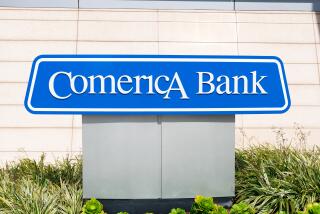Merger Wave Continues in Texas as 2 Big Banks Agree on $580-Million Stock Swap
- Share via
RepublicBank and InterFirst, Texas’ second- and third-largest banks, announced Tuesday that they would merge in a $580-million stock swap deal, creating the state’s largest bank.
The surprise announcement came just a day after Chemical New York Corp. agreed to acquire Texas Commerce Bancshares for $1.19 billion. The two huge deals reflect the severity of Texas’ economic slump and mark a lasting change in the nature of the state’s banking system.
Analysts and bankers had not expected a merger of two major Texas banking companies because such a combination would remain vulnerable to further deterioration of the Texas economy and would not bring any new bank capital into the state.
RepublicBank and InterFirst together have more than $1.8 billion in bad loans, chiefly as a result of a depression in the state’s real estate and energy industries.
Huge Loan Losses
All of Texas’ “big six” banking companies have been hurt by the state’s faltering economy. Overbuilding of office buildings, particularly in Houston, led to millions of dollars in loan losses, while a 50% fall in the price of oil in the past 15 months has driven hundreds of energy companies into bankruptcy, making their bank loans uncollectible. Farmers and their bankers have suffered from low crop prices for four years.
So far this year, federal regulators have closed 23 Texas banks, mostly small, rural institutions.
The resulting banking crisis led the Texas Legislature to pass emergency legislation this summer allowing out-of-state banking companies to acquire Texas banks. Most observers expected a number of major interstate deals like Chemical’s acquisition of Texas Commerce, but few predicted a big in-state combination like the RepublicBank-InterFirst merger.
Other Takeover Candidates
The two deals announced this week take three of Texas’ six biggest banks off the market. The other three--MCorp of Dallas, First City Bancorp of Houston and Allied Bancshares of Houston--are still seen as candidates for acquisition.
Several of the nation’s biggest banks are known to have been shopping in Texas. Among those that have expressed interest in moving into Texas are New York’s Citicorp and Chase Manhattan and Los Angeles’ Security Pacific and First Interstate Bancorp.
The new organization announced Tuesday, to be called First RepublicBank, will have assets of more than $35 billion, making it the nation’s 12th-largest banking firm. Both banks are based in Dallas.
Robert H. Stewart III, chairman of the board and chief executive of InterFirst, said he expects the transaction to be completed sometime during the first quarter of next year.
Stewart will be chairman of First RepublicBank, and Gerald W. Fronterhouse, who is chairman and chief executive of RepublicBank, will be the president and chief executive of the new company.
At a news conference held by the two banks, Fronterhouse described RepublicBank’s acquisition of InterFirst as an “offensive move” against its new competitor, Chemical New York.
First RepublicBank “is a company made by Texans for Texas,” Fronterhouse said. “While having a regional orientation, it will also be able to compete on a national basis with anyone.” Added Stewart, “You can’t be an ostrich. It’s a sign of the times. The banking business is much too fragmented.”
RepublicBank officials said they intend to pare the combined bank’s work force by 3,000 people, or 18%, during the next two years. They said they also plan to close about 25 of the combined bank’s 109 subsidiary banking offices in markets where they overlap. The closings and layoffs will save the new bank about $75 million in overhead costs during the first year after the merger, officials said.
Under the merger agreement, each common share of RepublicBank will be converted into one common share of First RepublicBank. RepublicBank has about 27.4 million common shares outstanding.
In addition, each InterFirst common share will be converted into 0.08 of a share of First RepublicBank, 0.1 of a share of a new convertible common share and 0.02 of a share of preferred stock with a declared value of $100. InterFirst has 67.2 million shares outstanding.
InterFirst reported net income of $2.1 million, or 3 cents a share, in the quarter ended Sept. 30, compared to $16.2 million, or 24 cents a share, a year earlier. RepublicBank said it had a third-quarter profit of $16 million, or 51 cents a share, down from $35.7 million, or $1.21 cents per share.
Both institutions have seen earnings shrink as they have been forced to set aside large sums for future loan losses.
Some banking analysts had said any merger between InterFirst and RepublicBank probably would require financial assistance from the Federal Deposit Insurance Corp. and other regulators to help ease the burden on the combined company of InterFirst’s $1.1 billion in non-performing loans.
But Stewart said Tuesday that no such assistance was needed to complete the deal.
Frank Anderson, a banking consultant with the Dallas firm of Ferguson & Co., said the new bank will be better able to compete with Chemical-Texas Commerce than either alone could have done.
“The big advantage is that it alleviates some of the rumors and the fear regarding InterFirst. Over time, you could end up with a stronger institution.”
Alex Sheshunoff, head of an Austin, Tex., bank consulting firm, said the RepublicBank-InterFirst merger was a gamble on a turnaround in the Texas economy, while Texas Commerce hedged its bets by seeking an out-of-state partner to share the risk.
Trading in the shares of both Dallas-based banks was halted throughout the day on the New York Stock Exchange pending the announcement of the merger.
RepublicBank stock closed Monday at $21.75 a share, up $1.375, and InterFirst at $5.125 a share, up 12.5 cents.
More to Read
Sign up for Essential California
The most important California stories and recommendations in your inbox every morning.
You may occasionally receive promotional content from the Los Angeles Times.













